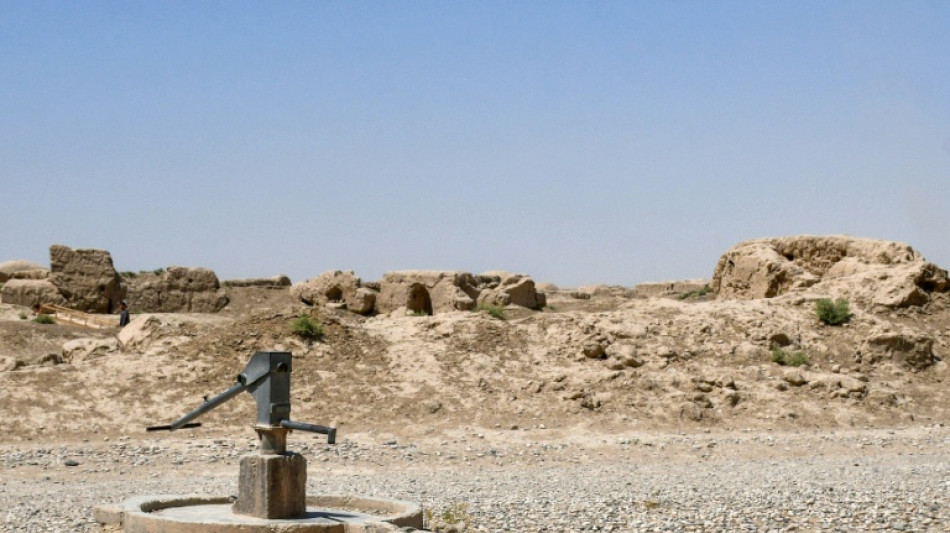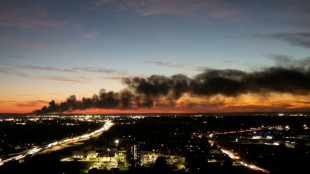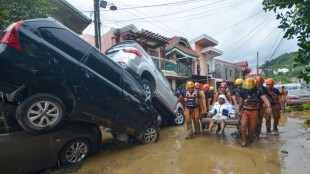
-
 Le Garrec welcomes Dupont help in training for Springboks showdown
Le Garrec welcomes Dupont help in training for Springboks showdown
-
Brussels wants high-speed rail linking EU capitals by 2040

-
 Swiss business chiefs met Trump on tariffs: Bern
Swiss business chiefs met Trump on tariffs: Bern
-
At least 9 dead after cargo plane crashes near Louisville airport

-
 France moves to suspend Shein website as first store opens in Paris
France moves to suspend Shein website as first store opens in Paris
-
Spain's exiled king recounts history, scandals in wistful memoir

-
 Wall Street stocks steady after positive jobs data
Wall Street stocks steady after positive jobs data
-
Trump blasts Democrats as government shutdown becomes longest ever

-
 Indian pilgrims find 'warm welcome' in Pakistan despite tensions
Indian pilgrims find 'warm welcome' in Pakistan despite tensions
-
Inter and AC Milan complete purchase of San Siro

-
 Swedish authorities inspect worksite conditions at steel startup Stegra
Swedish authorities inspect worksite conditions at steel startup Stegra
-
Keys withdraws from WTA Finals with illness

-
 Prince Harry says proud to be British despite new life in US
Prince Harry says proud to be British despite new life in US
-
BMW boosts profitability, welcomes Nexperia signals

-
 EU strikes last-ditch deal on climate targets as COP30 looms
EU strikes last-ditch deal on climate targets as COP30 looms
-
Stocks retreat as tech bubble fears grow

-
 Shein opens first permanent store amid heavy police presence
Shein opens first permanent store amid heavy police presence
-
West Indies edge New Zealand despite Santner brilliance

-
 French pair released by Iran await return home
French pair released by Iran await return home
-
German factory orders up but outlook still muted

-
 Death toll tops 100 as Philippines digs out after typhoon
Death toll tops 100 as Philippines digs out after typhoon
-
Attack on key city in Sudan's Kordofan region kills 40: UN

-
 'No one could stop it': Sudanese describe mass rapes while fleeing El-Fasher
'No one could stop it': Sudanese describe mass rapes while fleeing El-Fasher
-
Champagne and cheers across New York as Mamdani soars to victory

-
 Medieval tower collapse adds to Italy's workplace toll
Medieval tower collapse adds to Italy's workplace toll
-
BMW boosts profitability despite China, tariff woes

-
 South Africa's Wiese wary of 'hurt' France before re-match
South Africa's Wiese wary of 'hurt' France before re-match
-
Asian markets sink as tech bubble fears grow

-
 Beyond limits: Croatian freediver's breathtaking record
Beyond limits: Croatian freediver's breathtaking record
-
Tottenham supporting Udogie after alleged gun threat in London

-
 Thunder roll Clippers to stay unbeaten as SGA keeps streak alive
Thunder roll Clippers to stay unbeaten as SGA keeps streak alive
-
In appeal, Australian mushroom murderer alleges 'miscarriage of justice'

-
 Toyota hikes profit forecasts 'despite US tariffs'
Toyota hikes profit forecasts 'despite US tariffs'
-
Typhoon death toll soars past 90 in the Philippines

-
 Ex-France lock Willemse challenges Meafou to become 'the bully'
Ex-France lock Willemse challenges Meafou to become 'the bully'
-
Ukrainians to honour sporting dead by building country they 'died for': minister

-
 At least 7 dead after UPS cargo plane crashes near Louisville airport
At least 7 dead after UPS cargo plane crashes near Louisville airport
-
US Supreme Court hears challenge to Trump tariff powers

-
 US government shutdown becomes longest in history
US government shutdown becomes longest in history
-
India's Modi readies bellwether poll in poorest state

-
 Green goals versus growth needs: India's climate scorecard
Green goals versus growth needs: India's climate scorecard
-
Where things stand on China-US trade after Trump and Xi talk

-
 Sri Lanka targets big fish in anti-corruption push
Sri Lanka targets big fish in anti-corruption push
-
NY elects leftist mayor on big election night for Democrats

-
 Injured Jordie Barrett to miss rest of All Blacks tour
Injured Jordie Barrett to miss rest of All Blacks tour
-
Asian markets tumble as tech bubble fears grow

-
 Pay to protect: Brazil pitches new forest fund at COP30
Pay to protect: Brazil pitches new forest fund at COP30
-
Australia pick 'impressive' Weatherald in first Ashes Test squad

-
 Iraq's social media mercenaries dying for Russia
Iraq's social media mercenaries dying for Russia
-
Young leftist Trump foe elected New York mayor


From drought to floods, water extremes drive displacement in Afghanistan
Next to small bundles of belongings, Maruf waited for a car to take him and his family away from their village in northern Afghanistan, where drought-ridden land had yielded nothing for years.
"When you have children and are responsible for their needs, then tell me, what are you still doing in this ruin?" said the 50-year-old.
Many of the mud homes around him are already empty, he said, his neighbours having abandoned the village, fleeing "thirst, hunger and a life with no future".
Successive wars displaced Afghans over 40 years, but peace has not brought total reprieve, as climate change-fuelled shocks drive people from their homes and strain livelihoods.
Since the war ended between the now-ruling Taliban and US-led forces in 2021, floods, droughts and other climate change-driven environmental hazards have become the main cause of displacement in the country, according to the UN's International Organization for Migration (IOM).
In early 2025, nearly five million people across the country were impacted and nearly 400,000 people were displaced, the IOM said in July, citing its Climate Vulnerability Assessment.
The majority of Afghans live in mud homes and depend heavily on agriculture and livestock, making them particularly exposed to environmental changes.
The water cycle has been sharply impacted, with Afghanistan again in the grip of drought for the fourth time in five years and flash floods devastating land, homes and livelihoods.
"Crop failure, dry pastures and vanishing water sources are pushing rural communities to the edge," the UN Food and Agriculture Organization said in July.
"It's getting harder for families to grow food, earn income or stay where they are."
Experts and Taliban officials have repeatedly warned of escalating climate risks as temperatures rise, extreme weather events intensify and precipitation patterns shift.
The country's limited infrastructure, endemic poverty and international isolation leave Afghans with few resources to adapt and recover -- while already facing one of the world's worst humanitarian crises worsened by severe aid cuts.
- Too little -
Abdul Jalil Rasooli's village in the drought-hit north has watched their way of life wither with their crops.
Drought already drove many from his village to Pakistan and Iran a decade ago.
Now they've returned, forced back over the border along with more than four million others from the two neighbouring countries since late 2023 -- but to work odd jobs, not the land.
"Everything comes down to water," said the 64-year-old, retreating from the day's heat in the only home in the village still shaded by leafy trees.
"Water scarcity ruins everything, it destroys farming, the trees are drying up, and there's no planting anymore," he told AFP.
Rasooli holds out hope that the nearby Qosh Tepa canal will bring irrigation from the Amu Darya river. Diggers are carving out the last section of the waterway, but its completion is more than a year away, officials told AFP.
It's one of the water infrastructure projects the Taliban authorities have undertaken since ousting the foreign-backed government four years ago.
But the theocratic government, largely isolated on the global stage over its restrictions on women, has limited resources to address a crisis long exacerbated by poor environmental, infrastructure and resource management during 40 years of conflict.
"The measures we have taken so far are not enough," Energy and Water Minister Abdul Latif Mansoor told journalists in July, rattling off a list of dam and canal projects in the pipeline.
"There are a lot of droughts... this is Allah's will, first we must turn to Allah."
Hamayoun Amiri left for Iran when he was a young man and drought struck his father's small plot of land in western Herat province.
Forced to return in a June deportation campaign, he found himself back where he started 14 years ago -- with nothing to farm and his father's well water "getting lower and lower every day".
The Harirud river was a dry bed in July as it neared the border with downstream Iran, following a road lined with empty mud buildings pummelled back to dust by the province's summer gales.
- Too much -
Taliban authorities often hold prayers for rain, but while the lack of water has parched the land in some parts of the country, changes in precipitation patterns mean rains can be more of a threat than a blessing.
This year, rains have come earlier and heavier amid above-average temperatures, increasing flood risks, the UN said.
A warmer atmosphere holds more water, so rain often comes in massive, destructive quantities.
"The weather has changed," said Mohammad Qasim, a community leader of several villages in central Maidan Wardak battered by flash floods in June.
"I'm around 54 years old, and we have never experienced problems like this before," he told AFP in the riverbed full of boulders and cracked mud.
Eighteen-year-old Wahidullah's family was displaced after their home was damaged beyond repair and all their livestock were drowned.
The family of 11 slept in or near a rudimentary tent on high ground, with no plans or means to rebuild.
"We're worried that if another flood comes, then there will be nothing left and nowhere to go."
Q.Jaber--SF-PST
